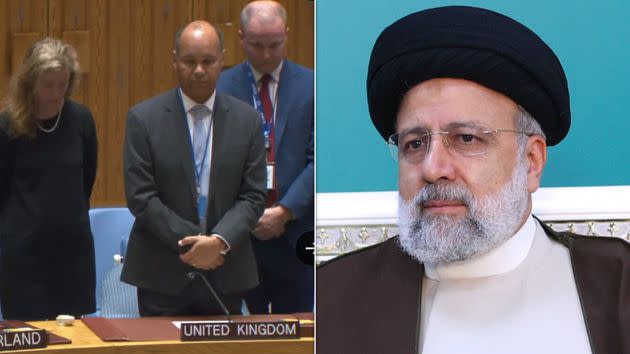UN Security Council Causes Controversy With Gesture In Honour Of Iran's Ebrahim Raisi

The UN Security Council observed a moment of silence in honour of Iranian president Seyyed Ebrahim Raisi on Monday – sparking fury among critics.
Raisi, known as the “Butcher of Tehran”, died in a helicopter accident on Sunday along with Iran’s foreign minister Hossein Amir-Abdollahian and other officials.
The UK’s deputy ambassador to the UN, James Kuriuki, was among those who stood at the request of Russia, China and Algeria for a moment of silence the following day.
UN Security Council members observe a moment of silence in remembrance of Iranian President Seyyed Ebrahim Raisi, Foreign Minister Hossein Amir-Abdollahian and other officials who died in a helicopter accident on 19 May pic.twitter.com/QLGzgA4q00
— UN News (@UN_News_Centre) May 20, 2024
But Raisi – and the Iranian government he was part of – was a deeply divisive figure.
For instance, Ukraine and its Western allies have accused Iran of manufacturing drones which have then been used to target Ukraine in Russia’s illegal war.
As former defence secretary Ben Wallace wrote on social media: “I hope no one in the FCDO [Foreign, Commonwealth and Development Office] approved the standing for a minute silence in the UN for the butcher of Tehran? If they did then ministers have questions to answer.
“Iran is busy exporting drones to kill people in Ukraine.”
President Vladimir Putin has called Raisi a “true friend of Russia” and a “wonderful person”, while declaring his death a “true tragedy”.
Putin reportedly held a two-hour meeting to help the search for the wreckage over the weekend after the aircraft first went missing.
Similarly, China’s authoritarian leader Xi Jinping said the “Chinese have lost a good friend” in Raisi – Western intelligence suggests Beijing has been supporting Iran its proxy war against Israel by buying Iranian oil.
Iran is also said to be funding militant groups, including Hamas, Lebanon’s Hezbollah and Yemen’s Houthi rebels.
As the chair of the Commons foreign affairs committee, Tory MP Alicia Kearns, said: “The UK recognises states, not individual governments, and as such as the minute’s silence as in respect of the country and the rank of the individual.
“However, for my part, one can respect the silence without standing for a man whose regime has committed femicide, is funding terror globally and attempted assassinations on UK and European shores.”
Israel’s ambassador to the UN, Gilad Erdan, wrote on X that the moment of silence a “disgrace”.
Raisi’s death seems to have triggered a mixed response across Iran.
The Woman Life Freedom movement began in September 2022, rebelling against the suppression of women and the death of 22-year-old Mahsa Amini, who died after she was arrested for supposedly not wearing her hijab correctly.
More than 22,000 people were detained and the crackdown saw more than 500 people killed as security services and the public clashed.
More than a year later, the so-called morality police are still upping patrols and women who refuse to wear headscarves are facing heightened abuse.
Raisi supported the Iranian security services throughout this period.
And, under the president’s supervision, Iran has been enriching uranium at near weapons-grade levels, and has been criticised for disrupting international inspections amid concerns about the country’s nuclear power.
Raisi was also seen as the frontrunner to be the next Supreme Leader in Iran.
He had been president since August 2021, when all of his feasible opponents were prevented from running.
Raisi himself faced sanctions from the US and other nations because he sentences thousands of prisoners of conscience to death in the 1980s.
The US state department also ended up defending itself after offering its condolences in the wake of Raisi’s death earlier today.
The US said the statement “in no way at all undermines” its previous criticism of Iran, and said the former president “has blood on his hands”.
As representative Matthew Miller noted, the US has made similar statements in the past after other divisive leaders, such as Josef Stalin, died.

